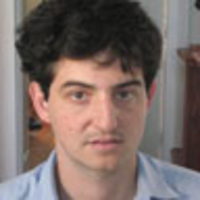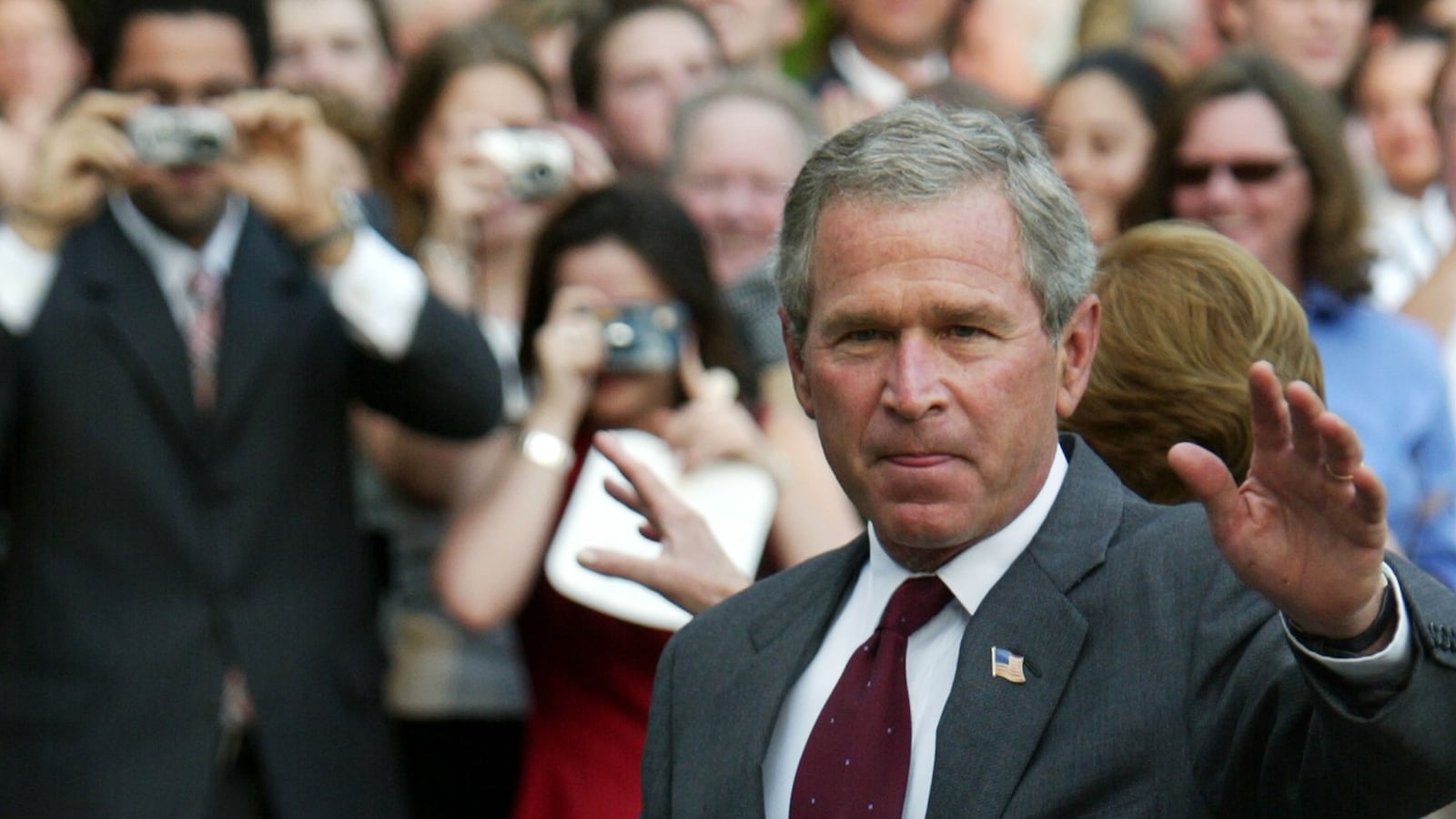Even before The Plot Against America was published, Philip Roth felt obliged to deny reports that his new novel was an allegorical indictment of George W. Bush. “Some readers are going to want to take this book as a roman a clef to the present moment in America,” he wrote in a long essay disputing this interpretation in the New York Times. “That would be a mistake.” Yet in the next paragraph Roth recalled the example of Franz Kafka, whose novels were used for political ends that Kafka could never have anticipated. “Literature,” shrugged Roth, “is put to all kinds of uses.” Roth, in other words, was trying to have it both ways. He insisted that he had not intended the novel to be political allegory, while knowing full well that it would be taken as such. It didn’t help to clarify his motives that he finished the essay by ridiculing Bush as “a man unfit to run a hardware store let alone a nation like this one.”
Roth’s dissimulation was not only a canny literary tactic; it was also a canny marketing tactic. The Plot Against America was his first novel to land on the bestseller list in 17 years. There it settled alongside a nonfiction list that, two weeks before the 2004 election, was dominated by Bush’s presidency. Although the perspective of these books ranged from respectful (Tommy Franks’ American Soldier) to critical (Kitty Kelley’s The Family, Seymour Hersh’s Chain of Command) and parodic (Maureen Dowd’s Bushworld and, at number one, Jon Stewart’s America (The Book)), the inescapable subject was Bush and his exertion of power. It seemed only logical that the nation’s most prominent novelist should have his say. If anything, Roth’s denial, issued weeks before the novel’s publication, was an enticement to critics who suspected he’d protested too much.

Even Roth could concede that some parallels existed between Bush’s America and his alternative history of the years 1940-1942, in which the Nazi sympathizer Charles Lindbergh is elevated to the White House on a split ballot and begins taking measures to ostracize America’s Jews, mollify Hitler, and promote fascism. President Lindbergh travels around the country in his aviator windbreaker and leather cap, swooping down from the sky to make triumphant declarations about American might; as Paul Berman wrote in his Times review, “you would have to be pretty dimwitted” not to flash on the image of Bush, decked out in his olive flight suit and aviator boots, stepping from the Navy One jet to deliver his “Mission Accomplished” speech aboard the USS Abraham Lincoln. You would also have to be pretty dimwitted not to hear, in Lindbergh’s self-serving determination to keep “all foreign wars out of America,” Bush’s token justification for waging the wars in Iraq and Afghanistan: “We’re taking the fight to the terrorists abroad, so we don’t have to face them here at home.” Lindbergh’s bromides and evasions are Bushian in their stubborn homespun simplicity, as are the Orweillian names of the Jewish-relocation programs “Just Folks” and “Homestead 42.” But most familiar of all to readers in 2004 was the constant sense of fear that is evoked on nearly every page of the novel, “a perpetual fear” that turns the lives of Roth’s Jewish characters—which include his own family, the Roths—into a waking nightmare. Nine-year-old Philip and his parents cannot shake the pervasive sense that “something essential had been destroyed and lost, we were being coerced to be other than the Americans we were…” all because “a political catastrophe of unimaginable proportions was transforming a free society into a police state.” “Calamity,” Roth writes elsewhere, “when it comes, comes in a rush.” Americans in 2004 could relate.
Yet the similarities end there. In its main points the novel diverges sharply from the world of 2004, often at a full revolution from reality. Lindbergh is an avowed pacifist, after all, who wins office in a landslide by appealing to the nation’s fear of war—a stance that couldn’t be further removed from Bush’s strategy, during the 2004 campaign, to appeal to a nation’s desire to continue the “war on terrorism.” Roth’s emphasis remains on the experience of American Jews, and their suspicions that they are being subtly but steadily marginalized. When violence does arise, it takes the form of pogroms in major cities that seem closely based on the civil rights riots of the late ’60s. Lindbergh, unlike Bush, is enormously popular across party lines; he flies by himself, without any security guards, even at the height of crisis, whereas Bush’s most famous flight was his dash to a secret military bunker on the morning of September 11. You have to squint very hard to make the novel begin to line up with reality.
The most striking divergence of all is the role played by Lindbergh’s chief public antagonist, the Jewish columnist Walter Winchell, who in Roth’s novel is Lindbergh’s harshest critic. Winchell is intemperate, irate, and irresponsible in his public attacks, for which he earns the undying gratitude of the Roth family and most everyone else in their Newark neighborhood. “Our voice of belligerent protest,” they call him. The neighborhood comes to a standstill during Winchell’s weekly diatribe; afterward families pour into the street to debate his ominous predictions. When it becomes clear that nobody else will challenge Lindbergh in the next election, Winchell announces his own candidacy. Not long after that, during a barnstorming tour of the country, he suffers the fate of all martyrs.
There was no Walter Winchell in the ramp-up to the Iraq war, no trusted figure who could muster rhetoric bombastic and incautious enough to balance that coming from the administration and its hawkish supporters. The editorial boards of the New York Times, the Washington Post, The New Yorker, and The New Republic supported the war; Oprah invited Kenneth Pollock onto her show to promote The Threatening Storm, a book that did much to build support for the war among liberal intellectuals. “The critical intelligentsia once so prominent in American cultural life has fallen silent,” wrote Tony Judt in a 2006 lament for the London Review of Books. “Liberalism in the United States today is the politics that dares not speak its name.” There was, of course, a minority of prominent critics of the war, and publications—particularly the New York Review of Books—that remained deeply skeptical of the administration’s claims and efforts to expand its power. (In the same issue of the Review that contained J.M. Coetzee’s review of The Plot Against America was an essay by David Cole, “Uncle Sam Is Watching You,” warning of secret federal programs designed to collect vast amounts of computer data from citizens.) But none dared to assume the inflamed register taken by Winchell in Roth’s novel:
“And how long will the American people stand for this treachery perpetrated by their elected president? How long will Americans remain asleep while their cherished Constitution is torn to shreds by the fascist fifth column of the Republican right marching under the sign of the cross and the flag?”
Nobody in 2004 spoke like that, but the reception that greeted The Plot Against America made it clear that Americans desperately wanted to hear such a voice. It might have been asking too much for Philip Roth to provide it, but the need was profound. Nobody understood this need more than Roth himself. “There was this feeling of powerlessness we had about Bush,” Roth later told Claudia Roth Pierpont, author of the critical biography Roth Unbound, “and no one of any consequence in the Democratic Party was speaking out. They grasped at this book as an articulation of their anger and frustration.”
The anger and frustration was so great that it didn’t really matter whether his novel articulated it or not.
Other notable novels published in 2004: The Inner Circle by T.C. Boyle
An Unfinished Season by Ward Just
Aloft by Chang-Rae Lee
Little Children by Tom Perrotta
Gilead by Marilynne Robinson
Our Kind by Kate Walbert
Pulitzer Prize:
The Known World by Edward P. Jones
National Book Award:
The News From Paraguay by Lily Tuck
Bestselling novel of the year:
The Da Vinci Code by Dan Brown
About this series:
This monthly series chronicles the history of the American century as seen through the eyes of its novelists. The goal is to create a literary anatomy of the last century—or, to be precise, from 1900 to 2013. In each column I’ll write about a single novel and the year it was published. The novel may not be the bestselling book of the year, the most praised, or the most highly awarded—though awards do have a way of fixing an age’s conventional wisdom in aspic. The idea is to choose a novel that, looking back from a safe distance, seems most accurately, and eloquently, to speak for the time in which it was written. Other than that there are few rules. I won’t pick any stinkers. — Nathaniel Rich
Previous Selections
1902—Brewster’s Millions by George Barr McCutcheon 1912—The Autobiography of an Ex-Coloured Man by James Weldon Johnson 1922—Babbitt by Sinclair Lewis 1932—Tobacco Road by Erskine Caldwell 1942—A Time to Be Born by Dawn Powell 1952—Invisible Man by Ralph Ellison 1962—One Flew Over the Cuckoo’s Nest by Ken Kesey 1972—The Stepford Wives by Ira Levin 1982—The Mosquito Coast by Paul Theroux 1992—Clockers by Richard Price 2002—Middlesex by Jeffrey Eugenides 2012—Billy Lynn’s Long Halftime Walk by Ben Fountain 1903—The Call of the Wild by Jack London 1913—O Pioneers! By Willa Cather 1923—Black Oxen by Gertrude Atherton 1933—Miss Lonelyhearts by Nathanael West 1943—Two Serious Ladies by Jane Bowles 1953—Junky by William S. Burroughs 1963—The Group by Mary McCarthy 1973—The Princess Bride by William Goldman 1983—Meditations in Green by Stephen Wright 1993—The Road to Wellville by T.C. Boyle 2003—The Known World by Edward P. Jones 2013—Equilateral by Ken Kalfus 1904—The Golden Bowl by Henry James 1914—Penrod by Booth Tarkington 1924—So Big by Edna Ferber 1934—Appointment in Samarra by John O’Hara 1944—Strange Fruit by Lillian Smith 1954—The Bad Seed by William March 1964—Herzog by Saul Bellow1974—Zen and the Art of Motorcycle Maintenance by Robert Pirsig1984—Neuromancer by William Gibson1994—The Stone Diaries by Carol Shields






